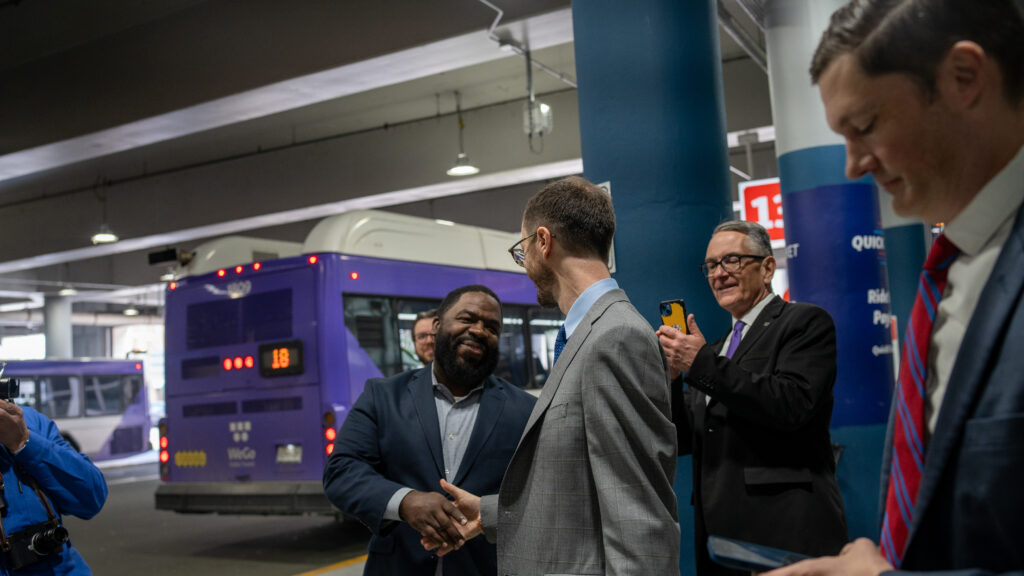
Nashville’s transit referendum has been upheld in court. A judge found that the referendum is valid and legal — which means the sales tax increase will go into effect on Feb. 1.
Read: Davidson County Chancellor Anne C. Martin’s full ruling
Nashville had already been working to implement its transit overhaul — like taking bids from companies to construct new transit centers and seeking a director to oversee the work. But the referendum, which nearly 66% of the city’s voters cast ballots in favor of, faced a legal challenge from the opposition campaign, Committee to Stop an Unfair Tax, and its chairwoman, Emily Evans.
In her ruling, Davidson County Chancellor Anne C. Martin found that the challenge was not a “proper” election contest under the Election Contest Act, given that there were not allegations of illegal ballots or fraud. Martin also found that the plaintiffs’ claim that Nashville Mayor Freddie O’Connell intentionally misled voters with the contents of the plan does not rise to the level of an election contest.
Martin also determined that even if the election contest challenge had been valid, that the referendum would still stand. She pointed to the requirements set out by state law, the IMPROVE Act, and found that the city met them — both in terms of the contents and language of the transportation improvement plan, and in the steps Metro took to secure the plan’s approval and qualification.
“The court’s ruling, today, stands with the will of Nashvillians and confirms the referendum complied with all elements of state law,” Mayor O’Connell said in a statement following the ruling. “I’m excited for all of us to be able to move past legal distractions and get to doing the work that people expect of us and asked us to do.”
The referendum
When voters passed the $3.1 billion transit referendum in November, they approved a plan that would raise the sales tax by a half-percent to fund things like more frequent bus service, new sidewalks and overhauled traffic signals.
More: Ongoing coverage of the transit referendum
The lawsuit alleged that the inclusion of things like sidewalks didn’t fall within the definition of “public transit” and rendered the project out of compliance with the state law — the IMPROVE Act — that authorizes localities to dedicate taxes to transit. It also questioned the plan’s inclusion of prospective federal grants.
The trial begins
Chancellor Martin heard arguments from both parties on Jan. 8, as she prepared to issue a decision on whether the referendum follows state law.
The plaintiffs — Evans and the Committee to Stop an Unfair Tax — were represented by attorney Kirk Clements. The city was represented by Metro Legal attorney Lora Barkenbus Fox and co-counsel Jeff Yarbro.
Michael Briggs, the mayor’s transportation advisor, was the sole witness to take the stand. Briggs talked through the steps Metro took to get the referendum on the ballot, including various public meetings, as well as three readings and subsequent approval by Nashville’s Metro Council.
Arguments heard
Clements, on behalf of the plaintiffs, focused his argument on the state’s definition of “public transit.” This, he claimed, did not include things like sidewalks and signals — cornerstones of the city’s plan.
“They’re trying to turn a mass transit system, the definition of a public transit system, into anything that may be connected to or resolved in arriving at a transportation facility or a bus stop,” Clements said. “Unfortunately, that’s not supported by the plain language of the statute.”
“Public transit system” is defined in the IMPROVE Act as “any mass transit system intended for shared passenger transport services to the general public, together with any building, structure, appurtenance, utility, transport support facility, transport vehicles, service vehicles, parking facility, or any other facility, structure, vehicle, or property needed to operate the transportation facility or provide connectivity for the transportation facility to any other non-mass transit system transportation infrastructure, including, but not limited to, interstates, highways, roads, streets, alleys, and sidewalks.”
In his closing argument for Metro, Yarbro pointed out that the sidewalks, signals and safety measures that would be implemented are located specifically around places receiving bus upgrades.
He also argued that it is not possible to develop a mass transit system without improving surrounding structures like sidewalks and signals.
“If you cannot work on the share of spaces where transit vehicles are going to be operating, that sort of defeats the ultimate purpose of the statute,” Yarbro said.
Plaintiffs also took issue with the number attached to the ballot measure. That estimated the project’s capital cost at $3.1 billion. Clements indicated that the city should have presented the “all-in” estimate — closer to $7 billion — which factored in inflation, operating costs and interest payments.
Yarbro defended the initial cost estimate as accurate.
“The most reliable data is the data that we have right now. We know how much asphalt costs right now. We know how much construction costs are right now,” Yarbro said. “In any event, there’s no requirement that this (estimate figure) be included on the ballot.”
The tight timeline
While the ruling was not immediately issued, Martin said she would do so soon — before the new transit sales tax began.
The plaintiffs were hoping to prevent the tax increase from taking effect Feb. 1. If they had been successful, the results of the transit referendum — of which two-thirds of Nashvillians voted in favor — would have been voided.
Because of the high stakes and tight timeline, the hearing on the lawsuit was expedited.
The trial began Wednesday, Jan. 8. This story was last updated at 2:55 p.m. Monday, Jan. 13.

